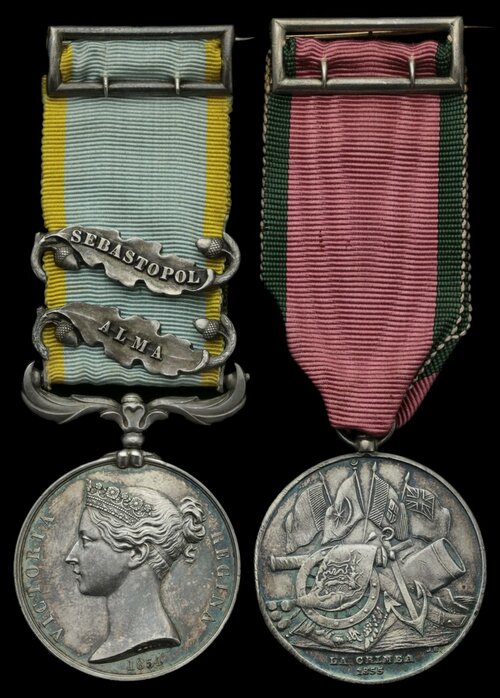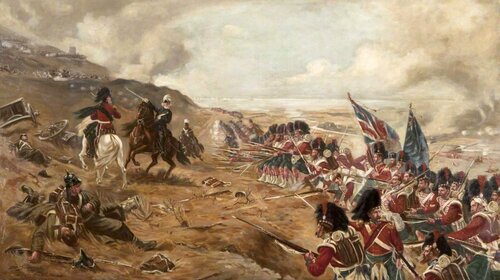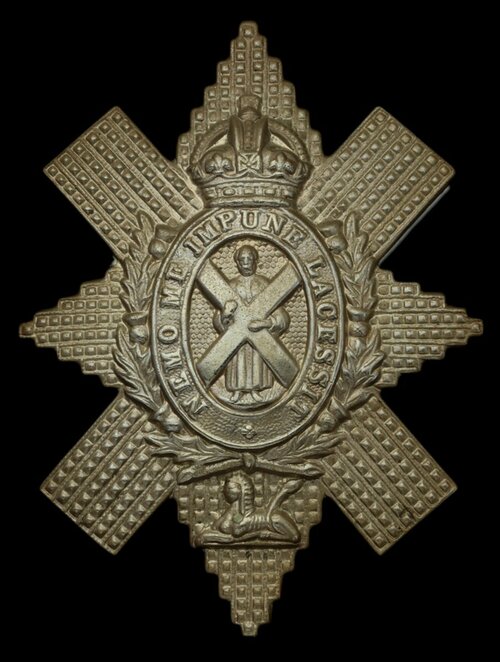Auction: 21002 - Orders, Decorations and Medals
Lot: 66
(x) The Crimean War pair to Ensign Malcolm Drummond, Viscount Forth, 42nd Royal Highlanders, who carried the Regimental Colour at the Battle of the Alma
Crimea 1854-56, 2 clasps, Alma, Sebastopol (Ensign. Vist. Forth. 42d. Foot.) contemporary engraved naming by Hunt & Roskell; Turkish Crimea 1855, Sardinian issue, Hunt & Roskell die, unnamed, both fitted with silver Hunt & Roskell riband buckles, traces of adhesive to reverses of ribands, good very fine (2)
Provenance:
John Burridge, 'A superb collection of Crimea War Medals', April 1997.
Spink Medal Circular, September 1998.
George Henry Charles Francis Malcolm Drummond, later Viscount Forth, was born on 13 May 1834, in Naples, the only surviving child of George Drummond, soldier, and his first wife, the Countess Rapp, née Baroness Albertine von Rothberg Rheinweiler Coligni, who died in 1842. In 1853 his father was restored as fifth Earl of Perth and second Earl of Melfort, but failed to recover the Drummond Castle estates from the Willoughby de Eresby family. From this date Malcolm Drummond took the title Viscount Forth.
He was appointed Ensign in the Black Watch on 4 November 1853, and reached the Crimea on 14 September 1854, where, on 20 September, he was present at the battle of Alma. He is depicted carrying the Regimental Colour in the famous painting Forward the 42nd! by Robert Gibb RSA. Captain Peter Halkett (afterwards Lieutenant-Colonel Sir Peter, Bart.) carried the Queen’s Colour on the same occasion and later recorded:
'I had now some trouble and anxiety, as when advancing in line, the whole Regiment ‘dresses’ upon the Colours, which are in the centre of the line, and Forth kept hanging back, requiring me constantly to keep on saying “Come on will you, you’re putting out the whole line” - and the Major of the left line, old Tom Tulloch rode up at once, and pitched into him.’
He afterwards served on trench and picquet duty before requesting leave to sell out [his commission] as soon as Sebastopol was taken. He then clashed with his commanding officer, Lieutenant-Colonel D.A. Cameron. By Forth’s own account, having not eaten for twenty-four hours, he refused to accompany a covering party until he had dined. Cameron, however, charged him with cowardice or insubordination. Forth resigned his commission on 17 October 1854, amid widely circulated detrimental versions of this incident.
Forth married on 24 October 1855, as St Peter’s Church, Pimlico, Harriet Mary, daughter of the Hon. Adolphus Capel. They lived with her parents at Wroughton, Wiltshire, where Forth soon manifested delirium tremens. He was violent and abusive to his wife, threatened to contract syphilis so as to infect her and their only child, a son born in 1856. She separated from him in 1858, and in 1860 petitioned for divorce on the grounds of his cruelty and adultery. After the Queen’s Proctor intervened, in 1861, to prevent her suit on the grounds of her adultery with Edward Cholmeley Dering, Sir Cresswell Cresswell ruled that a wife ‘guilty of adultery’ could not petition for relief on account of cruelty. Shortly afterwards Forth, who wished to avoid his creditors in London, settled at the Spa Hotel in Gloucester under the name of Captain Drummond, together with a woman who passed as his wife. She fell ill after delivering a daughter on 19 September 1861, and was devotedly nursed by Forth in a hotel room. Following her death on 8 October of that year he raved with grief, drank three-quarters of a pint of brandy, and swallowed a half bottle of laudanum, dying at the hotel from its effects after a few hours. A verdict of suicide was recorded. Forth was buried at Gloucester; sold together with copied research.
Subject to 5% tax on Hammer Price in addition to 20% VAT on Buyer’s Premium.
Sold for
£1,600
Starting price
£1200









